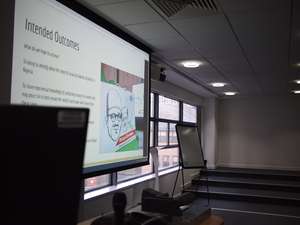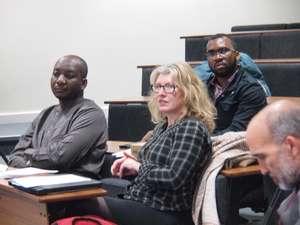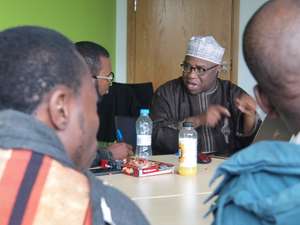ArtoP Symposium and Workshop Program

04/03/2019

Schedule Program Speakers: Open Session
10:00 : Dr.Paula Callus (Bournemouth University) & Dr. Charles Gore (SOAS)
The visual articulations of Politics in Nigeria: An Introduction to the Project
The presidential elections in Nigeria are a time of intense political and economic activity in which there is the mobilisation of political networks across institutions of the state at federal and state levels as well as activation of wider social linkages to communities and groupings that are often outside these defined political spheres. These are achieved in a range of ways including extensive patronage at the local government area level, outreach to communities and groupings autonomous to the political regimes and the ongoing induction of other groupings to the projects of various political factions vying for the presidency. Part of these process is the extensive commissioning of visual materials to interpellate such groupings and the individuals who make up their membership. In the 21st century with the extensive penetration of the mobile phone social media and development of digital platforms these have become key mediums in the outreach by political factions. Dr Gore and Dr Callus will be offering a background to the ArtoP project and providing an overview of the objective and aims aligned with this research.
10:40: Dr. Karen Fowler Watt (Bournemouth University)
Child Survivors of Colombia’s Armed Conflict: Animation as vehicle for reconciliation
This talk hopes to offer some insights to the ethical challenges that we encountered working on a project that aims to promote peace and reconciliation in Colombia as the country ends more than 50 years of internal armed conflict. Working with young people caught up in the conflict - some as child soldiers - the project incorporates an autobiographical approach to re-construct first-hand experiences of conflict and to highlight the challenges of reintegration. It presents the participants’ testimonies through a short animated documentary, that they helped to create themselves. It is widely acknowledged that peace-building occurs at the local level and is sustained through people-centred approaches. Hence, the film aims to promote the social inclusion of young people who have been exploited and marginalised, as well as provide a tool for peacebuilding education.
11:00 Dr Samantha Iwowo (Bournemouth University)
RUNS: A Film Screening and Discussion
Filmmaker, Samantha Iwowo, is a screenwriter and director who commenced her career as a commissioned screenwriter with South Africa’s largest cable network, M-Net, writing several episodes of the daily drama series, Tinsel (2008 – present), from 2013 to 2014. RUNS is docu-drama by Benedict Alli & Samantha Iwowo about six women from different backgrounds who share their experiences as runs/student prostitution. Dr Iwowo will be discussing the various approaches in making this film that negotiates tackling a taboo subject through different poetic devices.
11:30 Dr Jimoh Ganiyu (University of Lagos)
#We No Go ‘Gree: Internet Memes and Political Power Contestation in Nigeria.
Dr Ganiyu will examine internet memes as a unique form of political power contestation narratives in Nigeria. Through the use of social media platforms as vehicle of political communication, internet memes about politics explore issues that contain visual metaphors aimed at provoking discourse and stimulate political participation. By employing semiotic theory, this paper examines 200 pictorial internet memes on politics in Nigeria between 2015 and 2018, I argue that internet memes about politics are related to political cartoons in form and context. But unlike cartoons, required less artistic prowess and figurative expression in execution but could achieve the same desire in viewers. Owing to their composition of easily digestible visual elements, they appeal to more audience who in turn could easily lend their voices to a trendy meme by adding more textual or visual enhancement to create more layers of meaning.
12:00 Prof. Abdallah Uba Adamu (Bayero University)
Picturing Islam: Artistic Visuality and the Islamicate Culture in Northern Nigeria
In this presentation Prof. Adamu will discusses the spiritual, particularly awe-inspiring, representation of spirituality in religious media, especially reception of representation of Biblical and Islamic prophets in films targeted at popular culture consumption. He situates his discourse within the matrix of social control and censorship which seeks to limit such imagery (both mental and literal) in a society not tuned to symbolic imagery in representation of imagined reality. At the same time, he will explore the subterfuge around which the prohibited imageries are continually produced and consumed despite the prohibitions. The central focus is therefore on how such experimentation clashes with creative expression in an arena that brings to fore the subtle clashes between Western artistic creativity and modern African Islamic cultural realities and religious interpretations.
12:30 Prof. David Pratten (University of Oxford)
The arts of oil: a cultural history of Port Harcourt
How do the popular arts reflect a dialectic of enchantment and disenchantment with the Nigerian petro-state? In what ways do the popular arts celebrate its profits and politics, and critique its inequalities and injustices? Enchantment and disenchantment offer multivalent concepts from art, religion and politics with which to frame an investigation into the anthropology of Nigerian arts. https://www.anthro.ox.ac.uk/arts-oil-cultural-history-port-harcourt
13:00 - 14:00 LUNCH

Ethics and Risk Mitigation Workshop
Tues 5th (Room: EB305) Wed 6th March (Room: EB205)
As part of the ArtoP project, in the next 12 months researchers in different states in Nigeria will be collecting evidence of the range of visual articulations of politics in Nigeria that follow the elections of 2019. The data collection could present ethical dimensions around authorship, voice and visibility, connect to legal aspects in regards to copyright and archiving and pose potential risks to the research assistant and participants depending on the contexts and stakeholders that are interacting. In a political context which has been described as prebendalistic (Joseph, 1987), questions around patronage, identity and socio-political networks are implicitly connected to practices in research method.
The workshops are designed to respond to these concerns and to identify methodological approaches. It will run all day as informal sessions framed by dialogue and exercises.

Highlights Tuesday
11:00 - 11:30 - Dr Charles Gore (SOAS, London) on presenting case studies that frame dimensions of ethics and risk mitigation informed by fieldwork in Nigeria.
11:30 - 12:00 - Prof. Tejumola Olaniyan (Wisconsin University)
The African Popular Culture Research Project - A case study video presentation
2:00 - 3: 00 - Dr. Stephanie Schwandner Sievers (HSS, Bournemouth)
Equity and epistemic justice in research collaborations - reflecting on a student/staff project in post-conflict Kosovo
The Ethics and Risk Mitigation Workshop will present case studies to participants to use as vehicles with which to reflect upon practical scenarios that can arise whilst conducting research in politically sensitive contexts.
Highlights Wednesday
10:00 - 11:00 - Prof. Sam Porter (HSS, Bournemouth)
Q&A on Ethics Committee Processes
An opportunity to look at and address what are the main parameters of ethics to consider when designing research methods? To examine in conversation the institutional processes involved such as the ethics checklist for reflections on research integrity. To consider the implications arising from the design, method, and in particular dissemination and archival practices including the future uses of the visual data collected.
